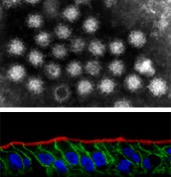Human norovirus propagation in iPS cell-derived intestinal epithelial cells (Sato Lab, in CMGH)
Human norovirus (HuNoV) is a major cause of intestinal infection, with diarrhea and vomiting. The recent development of a HuNoV replication system in human primary intestinal epithelial cells (IECs) has spawned advances in HuNoV characterization and opened up new strategies for HuNoV vaccine development. However, this technique currently requires human tissue cells and supplementation with bile, which contains unidentified components. Here, we report the replication of HuNoV in human induced pluripotent stem cell-derived IECs without bile. Furthermore, we provide evidence that vaccination with not only GII.4 but also GII.17 virus-like particles can induce neutralization antibodies against GII.4 HuNoV.
This article was published in Cellular and Molecular Gastroenterology and Hepatology.
Human norovirus propagation in human induced pluripotent stem cell-derived intestinal epithelial cells
Shintaro Sato, Kota Hisaie, Shiho Kurokawa, Akio Suzuki, Naomi Sakon, Yohei Uchida, Yoshikazu Yuki, and Hiroshi Kiyono
Links
- Home
- Achievement
- Research Activities
- Human norovirus propagation in iPS cell-derived intestinal epithelial cells (Sato Lab, in CMGH)








